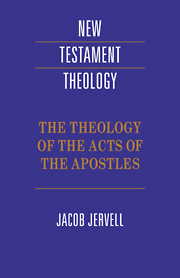5 - Acts in the history of early Christianity
Published online by Cambridge University Press: 05 June 2012
Summary
The contribution of Acts to our knowledge of the history of early Christianity is invaluable. First, Luke gives us information about what happened in the church from its beginnings to the last decade of the first century. Second, Acts itself is a testimony to the role of Jewish Christianity in the last decades of the first century and then furnishes us with a concept of the whole church. This has to do with the Jewishness of Acts in christology, ecclesiology, soteriology, the question of the law, the language – namely biblical Greek – and the portrait of Paul. Luke's interest in Jews and Jewish Christians is obvious. The explanation of this Jewishness, however, involves even the composition of the Lucan community. The catchword for this explanation is ‘history’; all the Jewish elements belong, for Luke, to the past. The time of Jesus belongs to the past, so do the apostolic era and the time of Paul, and Luke's own time is that of the third generation. Luke is a Gentile Christian, representing Gentile Christianity at the end of the century.
The common conception of early Christianity is by and large accepted: Christianity was in the beginning (Palestinian) Jewish Christianity; in the second period we find side by side Hellenistic Jewish Christianity, Gentile Hellenistic Christianity and Paul; in the third – when Luke lived – Gentile Christianity triumphed. In the second period, after 48 AD, Jewish Christianity was forced back and acted solely on the defensive, while in the third period, after 70 AD, Jewish Christianity mostly disappeared. Jewish Christians returned to the synagogue, became Gentile Christians, or settled as isolated Christian Jewish sects.
- Type
- Chapter
- Information
- The Theology of the Acts of the Apostles , pp. 123 - 127Publisher: Cambridge University PressPrint publication year: 1996



